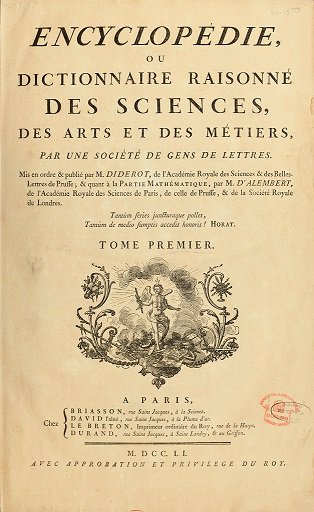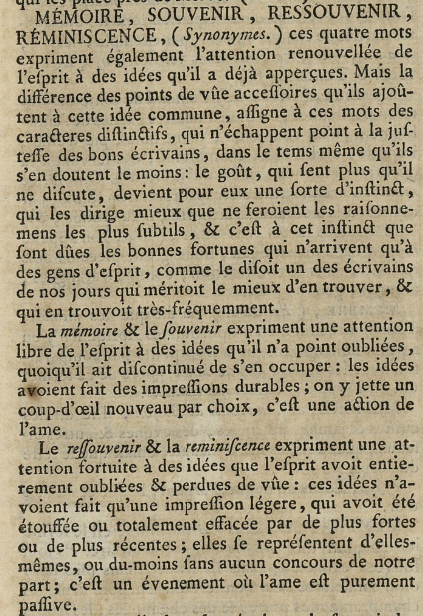The French notion of ‘souvenir’, associated with feelings, evokes both memories buried deep in the unconscious that have to be willed into consciousness, and memories on the surface of consciousness that are ever-present. A multi-faceted concept, it is defined in Diderot and D’Alembert’s Encyclopédie as represented by four related words: mémoire, souvenir, ressouvenir and réminiscence:
- MÉMOIRE, SOUVENIR, RESSOUVENIR, RÉMINISCENCE, (Synonyms.) These four words express equally the repeated attention of the mind to ideas it has already perceived. But the different nuances attached to this general idea … gives these words distinctive meanings… Mémoire and souvenir express the attention of the mind to ideas it does not forget, although those ideas no longer occupy it: the ideas have made permanent impressions; one casts a glance at them by choice, it is an action of the will … Mémoire however is concerned only with the ideas of the mind; it is the action of a faculty subordinated to intelligence, it seeks to enlighten. Souvenir, on the other hand, is concerned with ideas that interest the heart; it is the action of a faculty necessary to the sensibility of the soul, it seeks to arouse.
- MÉMOIRE, SOUVENIR, RESSOUVENIR, RÉMINISCENCE, (Synonymes.) ces quatre mots expriment également l’attention renouvellée de l’esprit à des idées qu’il a déjà apperçues. Mais la différence des points de vûe accessoires . . . assigne à ces mots des caracteres distinctifs. . . La mémoire & le souvenir expriment une attention libre de l’esprit à des idées qu’il n’a point oubliées, quoiqu’il ait discontinué de s’en occuper: les idées avoient fait des impressions durables ; on y jette un coup-d’œil nouveau par choix, c’est une action de l’ame. . . mais la mémoire ne concerne que les idées de l’esprit ; c’est l’acte d’une faculté subordonnée à l’intelligence, elle sert à l’éclairer: au-lieu que le souvenir regarde les idées qui intéressent le cœur; c’est l’acte d’une faculté nécessaire à la sensibilité de l’ame, elle sert à l’échauffer.[1]
This French derivation of ‘souvenir’ inflected both English and German understandings of the word, reinforcing the pan-European notion that the concept refers to the feelings inherent in material objects as much as the objects themselves.


Denis Diderot and Jean le Rond d'Alembert, Encyclopédie our Dictionaire Raisonné des Sciences, des Arts et des Métiers (Paris, 1751), title page; facsimile of passage quoted above.
[1] http://enccre.academie-sciences.fr/encyclopedie/article/v10-923-0/ (volume 10, page 326)